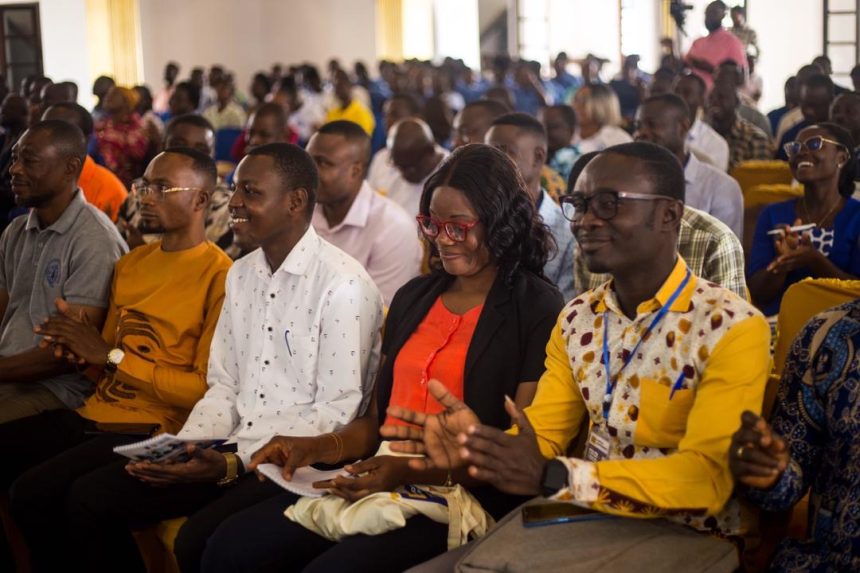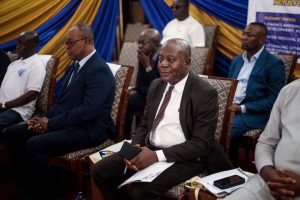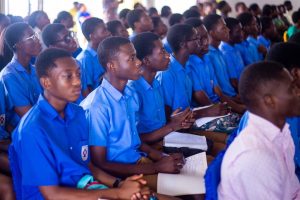The Ghana Geographers Association (GGA) launched its annual plenary conference for T-Tel teachers training on Wednesday, September 4, 2024, at the Department of Geography and Resource Development on the University of Ghana campus.
The event showcased a lineup of esteemed speakers, including Pro Vice-Chancellor of the Akenten Appiah Menka University of Skills, Training, Technology and Development; Dr. Winfred Nelson, Head of Research at the National Development Planning Commission (NDPC), Prof. Isaac Boateng and senior lecturer in Geography at the University of Education, Winneba.
The conference was hosted by the Head of the Geography Department and attended by various prominent dignitaries under the theme “Advancing Human Space and Technology Nexus For Sustainable Development.”
Dr. Kojo Oppong Yeboah Gyabaah delivered an insightful speech analyzing inter-regional comparisons of Sustainable Development Goals (SDGs) progress in Ghana.
“According to the chart, out of the 17 goals, there is only one goal; that is goal 12 which has achieved progress so far. All the others are either stagnating or making little progress.”
He further elaborated, “With goal 13, problems still exist but the progress, similar to goal 11, is still facing severe issues. Goals 1, 3, 5, and 6 are likewise confronted with significant challenges. Moreover, goals 1, 14, and 16 are also facing severe problems but no significant progress is being made. In terms of progress and achievement of the SDGs as a country, we are just about ahead; that is 32.9%. It is a limited progress of 41.1% and worsening a quarter.”
Prof. Boateng also emphasized the transformative potential of geospatial technology in fostering a more sustainable future for Ghana. He called on Ghanaians to leverage geospatial technology to drive sustainable development.
“This geospatial technology has created many jobs. The next entrepreneurs that are coming will rely on geospatial information to develop the next business.”
Dr. Winfred Nelson from the National Data Planning Commission also highlighted the importance of intra-cultural and inter-cultural coordination among municipalities and districts.
“When we come together to access funds as organizations, we could access about 25 million or more by working with a coordinated grid load impact. Recently, our coordination has been weak.”
Dr. Nelson further emphasized, “there should be vertical coordination in terms of the district working with regions, ministries, departments, and agencies. Dealing in terms of space, human capacity development, and technology, I want to emphasize from the National Urban Planning Commission that we have to work in a coordinated manner.”
Students from some prominent second cycle institutions such as Presbyterian Boys School-Legon, Achimota, and Accra Academy also shared their insights on Universnews.
“This conference has opened my eyes to see greater opportunities in the Geography field. Geography is more expansive than I thought.”
“Geospatial technology is something new to me but I was educated on it.”
Another student suggested implementing a National Geographical Quiz to broaden its scope.
“There is only one thing I am hoping for; just as the National Maths and Science Quiz has created a platform for mass education in science and maths, one way of achieving this influence in Geography is by creating a National Geographical Quiz where students will learn more about the SDGs and develop their critical thinking abilities to generate sound ideas for national policies.”
The conference not only highlighted the current challenges but also opened avenues for future innovations in geography education and sustainable development in Ghana.
Story By: Fauzia Salim | univers.ug.edu.gh







